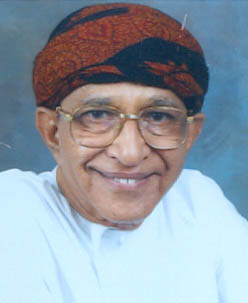
Muscat / Mangalore, January 26: Well-known physician Dr.Basheer Malik Muhammad, who hails from Beary Muslim community of Mangalore, passed away on at Royal Hospital at Muscat, the capital of Sultanate of Oman following a massive cardiac arrest. He was 76.
Dr Bashir was the Senior Consulting Physician/Cardiologist and Managing Director of Al Amal Medical and Health Care Centre. He was a well-qualified experienced clinician dedicated to his patients and is responsible for the overall management and smooth functioning of Al Amal Medical & Health Care Centre.
He was born in 1936 at Manjeshwar, (now in Kasargod dist), he had done his schooling in Manjeshwar and later joined then Government Arts College in Mangalore.
After obtaining his basic medical education in Bangalore he, went to United Kingdom and Ireland for his Masters and Fellowship from the Royal College of Physicians, Ireland. He also obtained a Diploma in Physical Medicine and Rehabilitation from the Conjoint Board, Royal College of Physician & Surgeons in London. In the United States, he went on to obtain his Fellowship with American Society of Hypertension.
Dr. Bashir arrived in Oman in 1977 and joined the Ministry of Health where he was Senior Consultant and Head of Department of Medicine. He was also attached to Sultan Qaboos University Hospital as Clinical Associate Professor in the Faculty of Medicine.
Dr. Bashir retired from Ministry of Health in 1996 with a vision to set up a multispeciality medical centre which would cater to all cross sections of society and provide best and ethical medical care at the most reasonable and affordable cost. Al Amal Medical Centre is the result of his dream coming true, and today it is one of the leading Health Care Provider in Oman. It is the first and only ISO 9001:2008 certified by British Standard Institute (BSI) –UK medical centre and has also obtained OPAL Certification in connection with Oman's Petroleum Industry.
Al Amal Medical & Health Care Centre under guidance from Dr. Bashir, has involved itself in the Oil Exploration and Drilling Industry. Such projects involve a high degree of Health Safety and Environment (HSE) knowledge and practise of laid down procedure to ensure a safe, healthy work environment.
Dr. Bashir has been in close association with PDO and other institutions to understand and study all such procedures. Paramedical and Medical manning of the drilling rigs, Pre employment medical examinations and periodic health ensuring medicals are done for the staff at Rig sites by Al Amal Medical Centre.
Dr. Bashir has thus achieved a lot of satisfaction and served Oman in his best possible way. His Majesty Sultan Qaboos Bin Said has conferred on him, the prestigious Civil Award in recognition of his services to the nation.
He owned a house at Falnir, Mangalore. His wife too hails from Mangalore. His last rites were performed at Amerat Cemetry, Wadi Hattat in Muscat after Zuhar Namaz on Thursday.
He is survived by his wife, four daughters and three son-in-laws and many grandchildren.





Comments
Add new comment